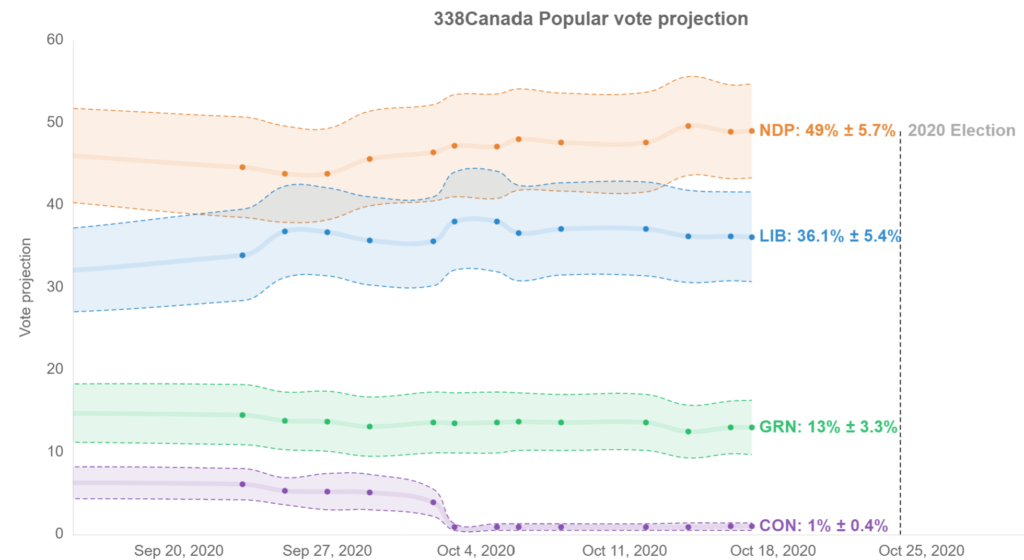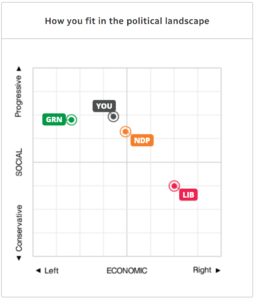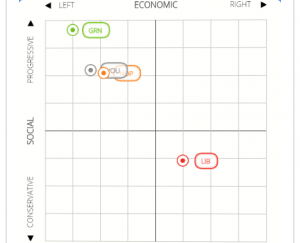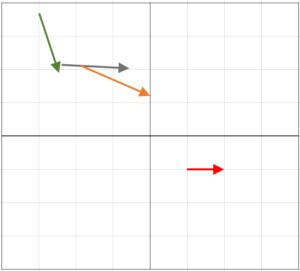Are we all enjoying the election?
Looking back, I haven’t actually posted much here about the election. I always get push-back from a few of the readers of this blog that they hate when I get all political and partisan, and just want me to report out on what the City is doing. Commonly, it includes some line like “you are elected to represent the *entire* City not just the lefties”! To which I feel I need to reference the parable of the scorpion and the frog. I’m a politician, I have been blogging about politics since long before I got elected. I have been partisan at times, and critical at times of parties and politicians I actually support. It would be disingenuous for me to put aside my understanding and opinions of public policy when the writ drops. caveat lector.
There is still a week to go, but so far the surprise of the election for me is the lack of surprise in this election. The NDP started with a substantial lead in the polls, and though there was some early correction-to-the-mean, there doesn’t seem to be much of a shift.
As we all learned in 2013, campaigns matter, and the BC Liberal campaign is somewhere between not-where-it-needs-to-be and full-on-dumpster-fire. The Green leader has deftly and swiftly shifted her party’s policy leanings to the left to take up some room vacated by the NDP, but it does not seem to be making an impact on the polling public. The Conservative collapse and retreat to their BC Liberal fall-back was predictable, and I wouldn’t be surprised to see a bit of last-minute tightening up of the front runners, if for no other reason than to keep viewers and voters awake. But the Libs need more than that. The knives coming out and discussion of Wilkinson’s leadership happening with a week still to go before the election is telling of a “broad tent” coalition without a guiding principle other than hating the other guys getting nowhere (something the NDP would be well served to keep in mind for next election).
One thing I have found interesting his election is (dispassionately?) observing the difference between incumbent campaigns and opposition campaigns. The Liberals especially have needed to re-frame their message significantly from three years ago, and austerity is not front and centre for anyone. But I still haven’t seen any interesting ideas challenging status quo this election. I suspect the NDP don’t need it, the Liberals are not capable, and the Greens are just not loud enough.
One media tool that hasn’t perhaps received as much attention this year as last election in my circles is the CBC Vote Compass. This data aggregator works a bit like a political Myer-Briggs test: you answer some questions to tell them what you think, and it spits back at you some summary of what you think after pressing it through some vague filtering mechanism. Mostly, it distills your complex political landscape into a pithy and compelling graphic that washes out all subtlety. Of course, I dutifully answered my questions and here is my politics sifted down to a single Cartesian point:
There are parts of this that feel accurate to me, no doubt because it was based on my own input. I think of myself as a little more left/progressive than the BCNDP (2020 version at least). The BCLibs supposedly-broad tent is well outside of my campsite; no surprise there. I also think of myself more socially progressive than the BCGreens (2020), but cannot rectify their allegedly being more economically “left” than I am.
I am going to skip over for now the entire can of worms that is drawing a divide between social policy and economic policy. It is, in the technical term, bullshit. Social policy *is* economic policy, and vice versa. Much smarter people than me have plumbed those depths, no point rehashing here. There is also a conceit in thinking that these two axes are the only ones, or even the most important ones, in people’s political narrative. Wherefore the Urbanist?
Instead, I want to pull up this image I dredged up from my archives of a Vote Compass I completed during the 2017 provincial election. I think it shows that not only is the Vote Compass a black box, but the apparently-simply graphic it outputs is not without its own political bias:

Though I have learned quite a bit (I think) in the last three years about reconciliation, have been challenged by BLM and related Canadian protests, and emboldened perhaps by the Climate Strikes, I don’t think my political ideas and ideals have shifted significantly since 2017. My position slightly left/progressive of the “center” of the NDP is probably as true now as then. But notice the axes around which the three parties have been aligned have shifted dramatically.
In the (upper) 2020 Compass, the NDP have been placed at the economic centre, when in 2017 (lower) they were well left of it – almost half way to the edge of the grid. The Liberals have in 3 years been pushed further right of the “centre”. Did the parties move, or the axes? Are these axes meant to represent some societal or political consensus? If not, then what are they?
The social axis is even more interesting. The Liberals are shown not shifting relative to this axis (which is arguable when comparing Christy Clark to Andrew Wilkinson in their ability to keep Laurie Throness quiet), where both the NDP and the Greens have been shifted markedly away from the “progressive” end of the spectrum towards the centre. I was bothered by where the Andrew Weaver Greens were placed on the 2017 grid, especially relative to the NDP because their policy and messaging simply did not reflect that, but the 2020 Greens under Furstenau have clearly staked out a more progressive agenda which simply isn’t reflected in this graphic.

Put it all together, and the Vote Compass is showing a shift of all parties and me, or of the centre. Is this real? Is this an artifact of public opinion, of party policy shifts, of media bias, or just a freak of an algorithm?
Yes, I am reading too much into this. But political communications is all about reading too much into things. Now go vote.